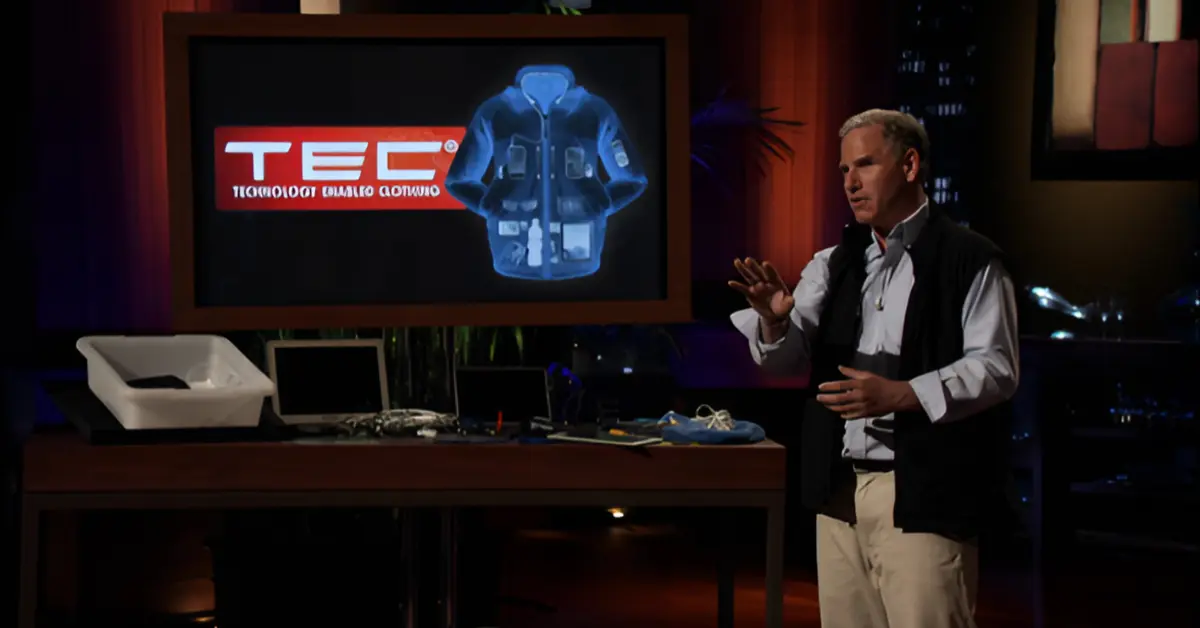The world of entrepreneurship is full of high-stakes decisions, bold pitches, and dramatic clashes. Few moments in the history of Shark Tank have been as controversial as Scott Jordan’s pitch for Technol cogy Enabled Clothing. His appearance on Season 3 of the hit show led to heated exchanges, public disputes, and ongoing business success despite walking away without a deal. This article explores the entire journey of Technology Enabled Clothing, from its Shark Tank pitch to its long-term impact on Scott Jordan’s business empire.
Table of Contents
ToggleTechnology Enabled Clothing Net Worth
As of 2023, Scott Jordan’s net worth is estimated to be around $65 million. Despite various controversies and business challenges, he has managed to sustain his success through strategic business decisions, licensing deals, and brand growth. His ability to navigate financial setbacks, reclaim control of his company, and continue innovating in the apparel technology space has solidified his position as a formidable entrepreneur.
Key Takeaways
- Scott Jordan’s Pitch: He sought $500,000 for 15% equity in Technology Enabled Clothing but excluded ScottEvest, his profitable outerwear brand, from the deal.
- Shark Tank Drama: Mark Cuban accused Jordan of being a “patent troll,” leading to one of the show’s most heated confrontations.
- Investment Offers: Kevin O’Leary and Robert Herjavec made offers, but Jordan rejected them after consulting Steve Wozniak.
- Post-Shark Tank Growth: Despite walking away, ScottEvest grew significantly, reaching $20 million in projected sales in 2013.
- Controversies and Setbacks: Jordan was forced to step down as CEO in 2017 but reclaimed control in 2019 after a financial crisis.
- Current Status: ScottEvest’s revenue stabilized at $3 million in 2023, and Jordan’s net worth is estimated at $65 million.
- Lessons Learned: Entrepreneurs should understand business valuation, recognize the complexities of patents, and remain adaptable to industry changes.
Overview
| Category | Details |
|---|---|
| Name | Technology Enabled Clothing |
| Founder | Scott Jordan |
| Industry | Apparel Technology |
| Product | Patented system for gadget-friendly outerwear |
| Funding | Seeking $500,000 |
| Investment Ask | $500,000 |
| Equity Offered | 15% |
| Valuation | $3.33 million |
Who is Scott Jordan?
Scott Jordan, the founder of Technology Enabled Clothing, is a serial entrepreneur, an innovator in tech-friendly apparel, and a man known for his strong opinions. With a background as a non-practicing attorney, Jordan leveraged his legal knowledge to build a business empire centered around patented clothing technology.
His most famous brand, ScottEvest, specializes in outerwear designed for gadget lovers, featuring hidden pockets, wiring systems, and advanced storage solutions for modern devices. While ScottEvest has been a success story in its own right, Jordan sought to expand his influence by licensing the core technology behind it through a separate entity—Technology Enabled Clothing.
The Shark Tank Pitch
The Ask
Scott Jordan appeared on Shark Tank in Season 3, Episode 11, seeking a $500,000 investment in exchange for 15% equity in Technology Enabled Clothing. Unlike traditional pitches, Jordan was not offering a stake in ScottEvest, the highly profitable outerwear company generating millions in revenue. Instead, he presented an opportunity for the Sharks to invest in his patent licensing business, which aimed to monetize the unique storage and wiring system embedded in his clothing designs.
The Product: Technology Enabled Clothing
Technology Enabled Clothing (TEC) is a patented system that incorporates waterproof internal pockets and wiring channels to help users carry their gadgets efficiently. The design enhances convenience, improves security, and makes traveling through airport security checkpoints easier by reducing the need to remove electronics from clothing.
Jordan’s strategy was to license this technology to major apparel manufacturers, allowing them to integrate it into their own products. Given the increasing reliance on mobile devices, he believed there was a strong market for gadget-friendly clothing.
The Sharks’ Reaction
Jordan’s pitch quickly became one of the most intense and controversial in Shark Tank history. While his product was intriguing, his approach to patents and business negotiations sparked heated debates among the Sharks.
Mark Cuban vs. Scott Jordan
Mark Cuban, the outspoken billionaire investor, was particularly critical of Jordan’s business model. He accused Jordan of being a “patent troll,” implying that he was more focused on litigation and enforcing patents than on innovating. Cuban argued that wireless technology advancements would eventually make Jordan’s wired clothing obsolete.
Their debate escalated into a confrontation, with Jordan strongly defending his patent strategy and Cuban firmly rejecting the idea that such patents should be the foundation of a business. Cuban ultimately declared himself “out,” refusing to invest in Technology Enabled Clothing.
Other Sharks’ Opinions
- Daymond John sided with Cuban, believing the patent approach was problematic and that wearable technology trends were shifting away from wired solutions. He also opted out.
- Barbara Corcoran was put off by the heated arguments and preferred to avoid the drama, making a quick exit from the negotiation.
- Robert Herjavec saw potential in the business and made an offer: $500,000 for 15% of Technology Enabled Clothing and ScottEvest.
- Kevin O’Leary also recognized the value of the business and proposed a joint deal with Herjavec: $1 million for 30% equity in both Technology Enabled Clothing and ScottEvest.
The Rejection and a Call to Steve Wozniak
Jordan was unwilling to give up equity in ScottEvest, believing its valuation was much higher than the Sharks acknowledged. To validate his stance, he stepped out of the room and called Apple co-founder Steve Wozniak, seeking his opinion on the offer. Wozniak agreed that the Sharks were undervaluing ScottEvest.
Armed with this feedback, Jordan returned and turned down the offers, walking away without a deal. The decision led to significant backlash from the Sharks, particularly Cuban, who continued to criticize Jordan’s approach long after the show aired.
The Aftermath: Controversy and Public Feuds
The Shark Tank episode was just the beginning of a long-standing feud between Scott Jordan and Mark Cuban. Their disagreements spilled over onto social media, where they engaged in a very public argument about patent strategies and business ethics.
Twitter War
Cuban openly supported a competing company, AyeGear, which was accused of copying ScottEvest’s designs. The Twitter battle included exchanges such as:
- Scott Jordan: “@mcuban #Levi’s received a patent on rivets, making Levi’s what it is today. Is that nonsense? Why do you think you know more than patent examiners?”
- Mark Cuban: “@scottevest doesn’t surprise me that you have to go back to the 1800s to find an example.”
- AyeGear: “@mcuban the day we launched, guess who our first email was from? Outrageous claims were made without even inspecting it.”
- Mark Cuban: “@AyeGear people will easily figure out workarounds. That’s why his patent should be worthless.”
Despite the negativity, Jordan remained steadfast in his belief that his patents were valuable and essential for his business.
Conclusion
Scott Jordan’s Shark Tank appearance remains one of the most debated pitches in the show’s history. While he didn’t secure an investment, he showcased the importance of valuing one’s business appropriately and standing by one’s principles. His journey offers key lessons:
Know Your Business’s Worth – Investors will try to negotiate aggressively, but entrepreneurs must understand their true valuation.
Patents Can Be a Double-Edged Sword – While patents can protect innovations, they can also lead to legal battles and accusations of being a “troll.”
Adaptability is Crucial – From leadership changes to pandemic-related challenges, businesses must be willing to evolve.









